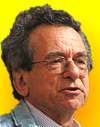 (source)
(source)
|
N. David Mermin
(30 Mar 1935 - )
American physicist who specializes in solid-state physics. He shares credit with Herbert Wagner for the Mermin-Wagner theorem with applications in quantum field theory and statistical mechanics. He coined (1976) the term “boojum” applied in context of one of the phases of superfluid helium-3.
|
Science Quotes by N. David Mermin (8 quotes)
A distinguished Princeton physicist on the occasion of my asking how he thought Einstein would have reacted to Bell’s theorem. He said that Einstein would have gone home and thought about it hard for several weeks … He was sure that Einstein would have been very bothered by Bell’s theorem. Then he added: “Anybody who’s not bothered by Bell’s theorem has to have rocks in his head.”
— N. David Mermin
In 'Is the Moon There When Nobody Looks? Reality and the Quantum Theory', Physics Today (Apr 1985), 38-47.
Bridges would not be safer if only people who knew the proper definition of a real number were allowed to design them.
— N. David Mermin
In 'Topological Theory of Defects', Review of Modern Physics (Jul 1979), 51, No. 3. 591–648. This is seen widely on the web (? mis-)attributed to H.L. Mencken, for which Webmaster has so far been unable to find any validation whatsoever.
I am awaiting the day when people remember the fact that discovery does not work by deciding what you want and then discovering it.
— N. David Mermin
In 'How Not to Create Tigers', Physics Today (Aug 1999), 52, No. 8, 12. Collected in Why Quark Rhymes with Pork: And Other Scientific Diversions (2012), 150.
If I were forced to sum up in one sentence what the Copenhagen interpretation says to me, it would be “Shut up and calculate!”
— N. David Mermin
In column, 'Reference Frame: What’s Wrong with this Pillow', Physics Today (Apr 1989), 9. The Copenhagen interpretation refers to quantum mechanics. Mermin has since asked, 'Could Feynman Have Said This?', in Physics Today (May 2004), 10, if Richard Feynman may have used the “Shut up and calculate” retort first, since there were numerous examples giving that attribution on the web. To date (6 Jun 2015), no response supporting Feynman as a source has ever been received by Mermin. This was confirmed in an email to the Webmaster, which stated, “Nobody ever sent me any evidence that Feynman had said it. I’ve concluded that he didn’t, but it’s hard to prove a negative.” The reasonable conclusion is that this would almost certainly be a misattribution by the so-called Matthew effect to a more-famous person. Even seen attributed to Paul Dirac! In a Physics Forum web post (28 May 2014) The Austrian remembers being taught by a QM lecturer who liked using the quote, but added: “there is not much else to do in QM anyway.”
Over the past fifty years or so, scientists have allowed the conventions of expression available to them to become entirely too confining. too confining. The insistence on bland impersonality and the widespread indifference to anything like the display of a unique human author in scientific exposition, have transformed the reading of most scientific papers into an act of tedious drudgery.
— N. David Mermin
In Boojums All the Way Through: Communicating Science in a Prosaic Age (1990), Preface, xi-xii.
Particle physics has become the archeology of physics.
— N. David Mermin
In 'What's Wrong With Those Epochs', Physics Today (Nov 1990). Collected in Why Quark Rhymes with Pork: And Other Scientific Diversions (2016), 60.
Relations between authors and referees are, of course, almost always strained. Authors are convinced that the malicious stupidity of the referee is alone preventing them from laying their discoveries before an admiring world. Referees are convinced that authors are too arrogant and obtuse to recognize blatant fallacies in their own reasoning, even when these have been called to their attention with crystalline lucidity. All physicists know this, because all physicists are both authors and referees, but it does no good. The ability of one person to hold both views is an example of what Bohr called complementarity.
— N. David Mermin
In Boojums All the Way Through: Communicating Science in a Prosaic Age (1990), 19-20.
Scientists wrote beautifully through the 19th century and on into the early 20th. But somewhere after that, coincident with the explosive growth of research, the art of writing science suffered a grave setback, and the stultifying convention descended that the best scientific prose should sound like a non-human author addressing a mechanical reader.
— N. David Mermin
In Boojums All the Way Through: Communicating Science in a Prosaic Age (1990), Preface, xii.
 In science it often happens that scientists say, 'You know that's a really good argument; my position is mistaken,' and then they would actually change their minds and you never hear that old view from them again. They really do it. It doesn't happen as often as it should, because scientists are human and change is sometimes painful. But it happens every day. I cannot recall the last time something like that happened in politics or religion.
(1987) --
In science it often happens that scientists say, 'You know that's a really good argument; my position is mistaken,' and then they would actually change their minds and you never hear that old view from them again. They really do it. It doesn't happen as often as it should, because scientists are human and change is sometimes painful. But it happens every day. I cannot recall the last time something like that happened in politics or religion.
(1987) -- 


